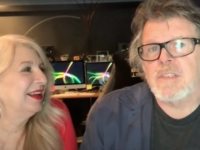A Romantic’s Guide to King Crimson? The band that gave us “21st Century Schizoid Man,” “Red,” “Vroom” and other songs that combined elements of hard rock, frenetic jazz, metal, even industrial?
That’s right. And if the title didn’t clue you in, it’s immediately clear from a quick listen you’re in for something different. The husband and wife team of Deborah Mastelotto (vocals) and Pat Mastelotto (one of Crimson’s three current drummers) plays around with tempos, instrumentation and mood on a dozen tracks from the band that many accuse of starting say started the whole prog-rock thing.
The gentle keyboards and clockwork drums that start off “Two Hands” are a clue, then Deborah Mastelotto’s lilting voice make it apparent this will only bear a passing resemblance to the King Crimson version from 1982’s Beat. The muted trumpet that floats in and out suits this version perfectly, as do the occasional vibes.
The following “Matte Kudasai” is slowed down to a dirge-like tempo. Deborah’s voice leaps out and then drifts back into the background. All the instruments – including voice – have the edges sanded off, leading to a gauzy sound, here and throughout the recording.
Things perk up a bit with “Heartbeat,” as Pat Mastelotto’s loping beat kicks it into gear. The electric piano offers shades of the Doors, and Deborah’s voice is much clearer and more prominent.
From those tracks from the ’80s quartet, the Mastelottos then harken back to the band’s origins. “Moonchild,” from King Crimson’s epic debut, might be an expected choice – but again, their treatment is not. The tempo is maybe a quarter of the original. Deborah’s voice is surrounded by a bed of atmospheric keyboards, and there’s that muted trumpet again, waaaaay in the background.
A Romantic’s Guide to King Crimson veers from 1969 to the ’90s with “Inner Garden” and “One Time” from 1995’s Thrak. The former features percussive effects while the latter might include violin, oboe and flute – or maybe it’s all synthesizers. Or some combination. It’s nearly impossible to tell, as the instruments are again subsumed into an exquisite blend. But Deborah’s voice stands out here, to great effect.
Whether easily identifiable or not, the sounds accompanying her voice are exquisite. There’s harp and oboe alongside flute on “Book of Saturday,” where Deborah sings even more behind the beat. On “Exiles,” her voice is more wistful than ever, while Pat’s tom rolls set the mood for the tune.
“Elephant Talk” is all atmosphere, and not a really pleasant one. Adrian Belew’s spoken word tone poem may not have been that out of place when it originally appeared on 1981’s Discipline, but romantic it ain’t. It’s really the only misstep on the album.
“People” is the bounciest tune on A Romantic’s Guide to King Crimson (bouncy being another term not often used in conjunction with Crimson). It also is the most percussive selection, but don’t look for any “B-Booms” or big drum solos. As opposed to the current iterations of King Crimson, Pat isn’t in the front line at any time on the recording.
It’s tempting to say that Pat Mastelotto’s drums take a back seat on this recording, but that’s not true. Everything takes a back seat. It’s all about atmospherics and presenting music from one of rock’s most enigmatic bands in a whole new light.
One of the delights of A Romantic’s Guide to King Crimson is how it takes material from the many very different versions of the band and makes all the tunes a part of the whole. In that, it’s similar to the most current versions of King Crimson, where Robert Fripp and his merry band essay songs from across the band’s 50-year history.
While In the Court, 1973’s Lark’s Tongues in Aspic, Beat and Thrak may feature wildly different personnel and musical approaches, the seven-headed beast comprising King Crimson since 2013 has effectively presented a band comfortable with putting its own spin on anything previous Crims recorded.
King Crimson has never really had anything resembling a hit. This recording won’t top the Billboard charts either, or whatever passes for defining a hit in these days of Pandora and Spotify. But don’t let that stop you. It’s a gorgeous record, all the more enjoyable for being unforeseen.
- Jon Anderson, Reza Khan, CSNY + Others: Ross Boissoneau’s Best of 2024 - December 30, 2024
- Tower of Power, Jennifer Hudson, Ben Folds + Others: 2024’s Seasonal Sounds - November 25, 2024
- Dave Bainbridge of Downes Braide Association: The Albums That Shaped My Career - October 9, 2024


